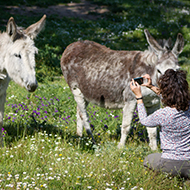Burying beetle larva begging for food from its parent
Mothers more likely to cannibalise greedy young, study finds
Scientists from the University of Edinburgh have found that burying beetles occasionally eat the offspring that pester them the most for food.
Researchers say this hardline punishment encourages the remaining beetle larvae to plead for food more honestly, depending on how hungry they are, rather than trying to compete with their siblings.
Beetles used in the study were given large foster families to see if they were more likely to cannibalise the offspring that pestered them most for food, and whether mothers could control which offspring to feed.
The research team found that when the mother beetles could control which of their young to feed, they chose to feed the older offspring, in a similar way to many other mammals and birds. Scientists suggest this could be because they are most likely to reach adulthood.
Dr Clare Andrews, of the university's School of Biological Sciences, explained: "We already knew that larvae beg more if they have been deprived of food but we had not known whether this is because they are informing their parents how hungry they are or whether they are simply squabbling with each other to get their parents' attention."
"Our study shows that if you're a baby beetle it doesn't pay to pester your mother for food unless you're really hungry. Communication is crucial in helping to mediate conflicts of interests between parents and offspring."
Image credit: Dr Per T. Smiseth






 RCVS Knowledge has called on vet practices to audit their post-operative neutering outcomes.
RCVS Knowledge has called on vet practices to audit their post-operative neutering outcomes.
